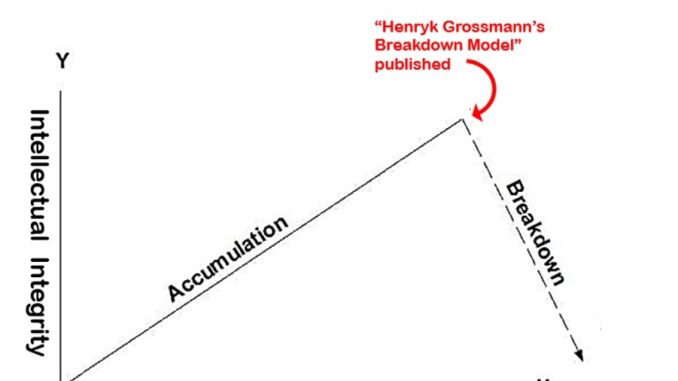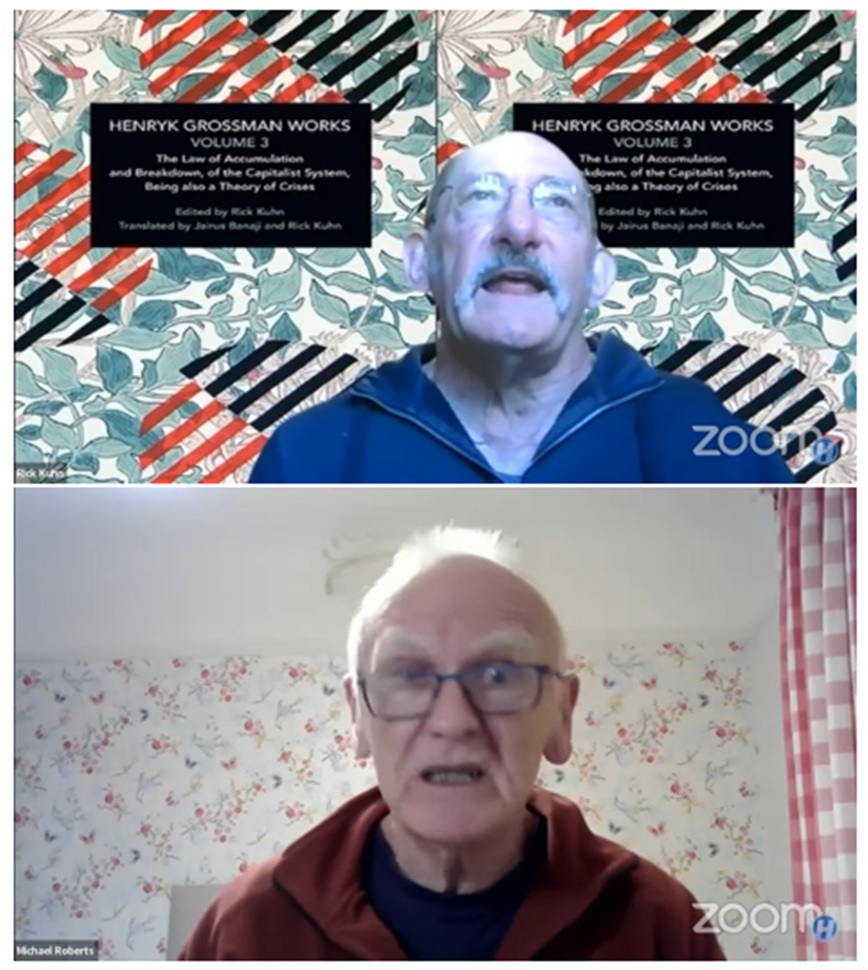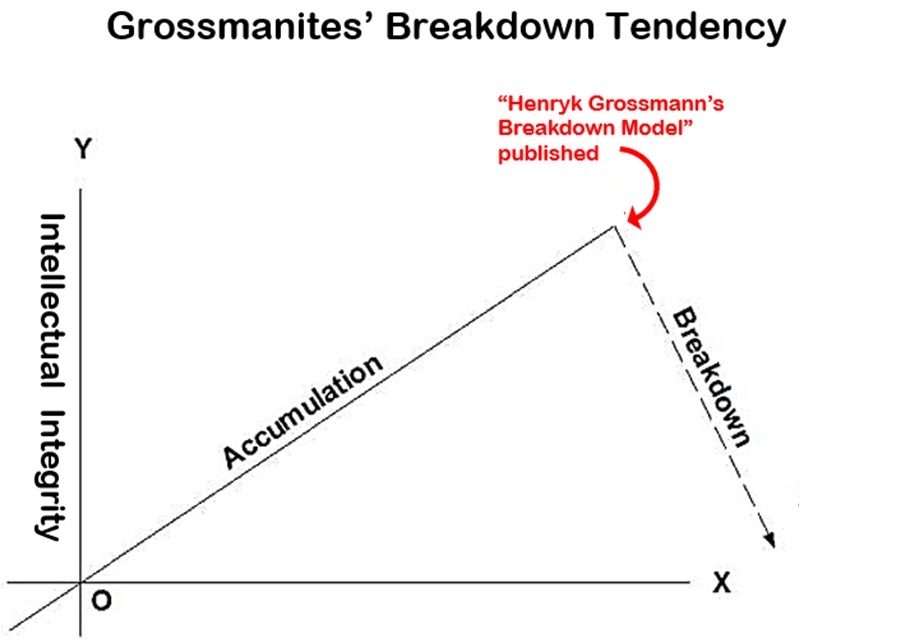
by Andrew Kliman
I don’t usually review works of fiction, but I’ll make an exception for “Contradictions at the Heart of Capitalist Production: Henryk Grossman,” a tragicomical production performed by Rick Kuhn and Michael Roberts. (Eleanor Morley has a bit part.) I watched the performance when it was streamed live last Monday. It can also be viewed here.
Kuhn and Roberts play themselves. Kuhn is a biographer of Grossman, and a translator and editor of many of Grossman’s writings, including his 1929 book, The Law of Accumulation and Breakdown of the Capitalist System, Being also a Theory of Crises. Michael Roberts is … well, Michael Roberts.[1]
“Contradictions at the Heart” is very loosely based on actual facts about Grossman’s book. However, in what could be an homage to the “The Bizarro Jerry” episode of Seinfeld—in which “up is down, down is up”—this production’s fictionalized version of Grossman “demonstrated how the capitalist system, even under supposedly ideal conditions, will break down economically” and he “recover[ed …] Marx’s explanations for capitalism’s crises and tendency to break down.” His recovery of “Marx’s” explanations is “as timely as ever.”
This heartwarming tale is guaranteed to bring a smile to the lips of fatalists and breakdown buffs of all ages!

In a characteristically bold performance, Roberts declares that there is a breakdown tendency, that Grossman’s arguments have been proven to be correct, and that he provided the best explanation of Marx’s argument regarding capitalism’s crises. But Roberts does more than declare this; he also shows us a downward-sloping graph of something that he calls the rate of profit. Bravo, bravissimo!
Kuhn’s performance is somewhat more tentative. He tells us much the same story that Roberts tells us, but he occasionally makes it seem as though he is just reporting what Grossman said, not making claims of his own. But the blurb for “Contradictions at the Heart” and its daring claims—“demonstrated,” “will break down,” “recovery of Marx’s explanations,” “as timely as ever”—were of course not written by Grossman himself.
And it is Kuhn who provides what is the most dramatic moment, for me at least, in this piece of theater. In a discussion of countertendencies to the alleged breakdown tendency, he notes that rising productivity causes the value of means of production to fall. The tension builds. Kuhn says that this fall in their value can cause a slowdown in the tendency of the rate of profit to fall. The tension builds even further. Will he now come clean and say that the supposed breakdown tendency can disappear entirely if the decline in the value of means of production is great enough? Will he come clean and say that the supposed breakdown tendency must disappear, according to Marx’s value theory, except in the most implausible cases?[2] …
No, he rushes ahead to talk about imperialism, war, and whatnot. And the fatalists and breakdown buffs all live happily ever after.
As for Roberts’s graph, we never learn precisely what it measures. Nor does he explain why a falling rate of profit provides empirical support for Grossman’s breakdown theory but not Marx’s actual crisis theory, in which the rate of profit falls but there is no Grossman-style breakdown. In any case, it is only in this tragicomic fantasy in which Roberts co-stars, not outside it, that his graph counts as empirical evidence in support of the Grossman’s fatally flawed breakdown theory. As I noted in a recent review of a book about the theory,
a theoretical conclusion that cannot possibly be true does not become truer just because the evidence may seem to confirm it. Evidence can never actually confirm false claims. Once we know they are false, we also know that they are being “confirmed,” not by the evidence itself, but by some combination of misinterpretation of, unwarranted inferences from, and cherry-picking of the evidence, as well as disregard of other possible interpretations of the evidence.
But no matter. One needs to suspend disbelief to appreciate theater, and this is theater. The graph trends downward. That’s the important thing.
Sixteen months ago, I published “Henryk Grossmann’s Breakdown Model: On the Real Cause of the Fictitious Breakdown Tendency.” The overall conclusion I reached is that “the Bauer-Grossmann reproduction scheme and the theory of breakdown and crisis derived from it are irreparably flawed.” Four months later, I painstakingly responded to objections to my demonstrations and arguments, which had been sent to me privately, and I reached the same conclusion. Apart from the notable and welcome exception of Ted Reese, none of the leading Grossmanites has been willing to discuss my demonstrations and arguments publicly, although Marxist-Humanist Initiative invited each of them to do so, and they all have a standing invitation to be interviewed on Radio Free Humanity, the podcast series I co-host along with Brendan Cooney.
However, “Contradictions at the Heart” is set in an earlier period, before all of this occurred. It transports us back to a time when all was for the best in the best of all Grossmanite worlds.
And really, why should we expect Kuhn and Roberts to engage with criticism? Not only do they seem to have no counterarguments to speak of—judging from their performances in “Contradictions at the Heart”—but they have been too busy rehearsing. The show must go on!
Notes
[1] For more information, see the “On Fatalism” subsection (including note 1) of section 2 of my article, “Henryk Grossmann’s Breakdown Model,” and the final question and response in my follow-up article that responded to challenges and questions.
[2] By “implausible cases,” I mean those in which physical output is somehow constrained to grow more slowly than physical productive demand and those in which capitalists somehow decide to invest more than their total profit in additional means of production and labor-power.



Be the first to comment